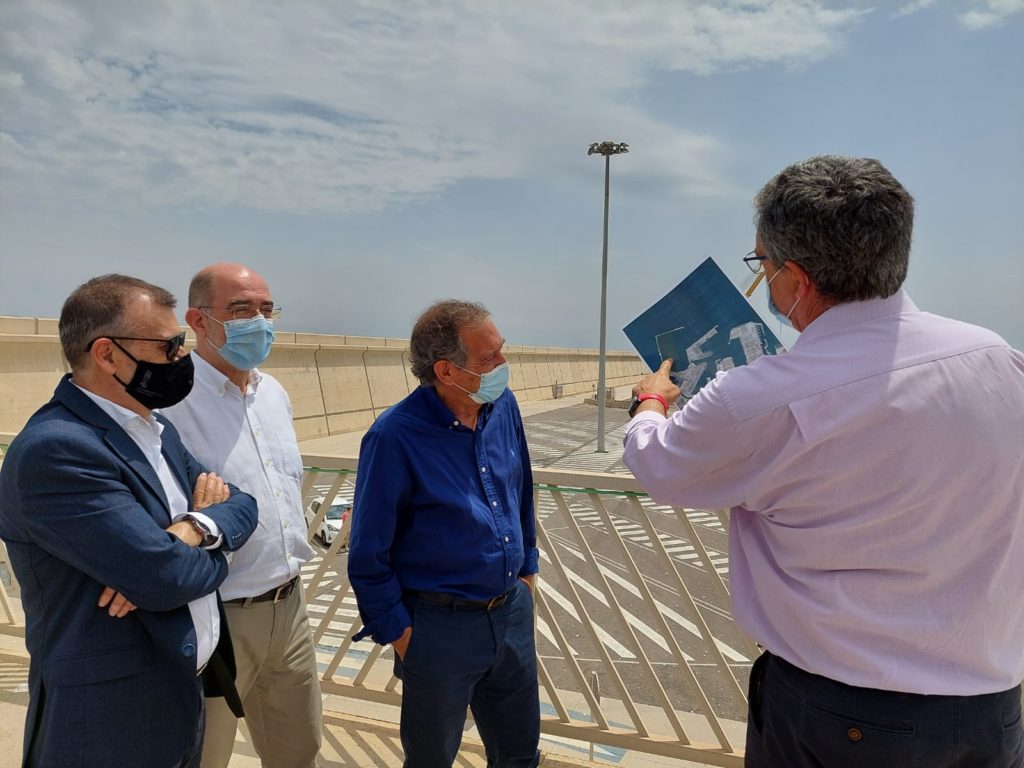
The regional secretary for Education and Vocational Training, Miguel Soler, visits the training classrooms and terminals of the Port of Valencia
Aurelio Martínez stresses the importance of this initiative for the generation of wealth and employment in a sector with a large presence in the Valencian Community and with enormous growth potential
Last May, the 1st edition of the Dual Port Immersion Vocational Training (FP Dual Inmersión Portuaria) began face-to-face classes in the Port of Valencia, a pioneering initiative in the sector led by the Valenciaport Foundation, the Generalitat Valenciana and the APV with the support of Propeller Valencia
The new vocational training courses are designed to meet and take advantage of the training opportunities and needs generated by a driving company such as Valenciaport and its port community
València, June 18th, 2021.- The Generalitat Valenciana, the Valenciaport Foundation and the Port Authority of Valencia (PAV), with the support of the association Propeller Valencia, have joined forces to launch the Dual VET Port Immersion, the 1st edition of which began on-site classes in the port of Valencia on 31 May. The main objective of this training is for the students to be familiar with the most common operations in the companies of the logistics-port community and to be able to carry out their work effectively and efficiently, thus favouring their subsequent incorporation into the labour market.
Through this project, students of the higher degrees in International Trade and Transport and Logistics are being trained as managers of transport companies, as well as freight forwarding and shipping companies, receiving a total of 2,600 hours of training, of which 800 hours will be work experience in companies in the sector (400 of which will be dual training hours paid by means of a grant).

On the other hand, it is also planned to launch in the 2022-2023 academic year a new Port Logistics Specialisation VET, coordinated between the Directorate General for Vocational Training and Special Regime Education of the Regional Ministry of Education, Culture and Sport, the Valenciaport Foundation, the PAV and the Pere Boil Institute of Manises. This programme, focused on the field of commerce, logistics and transport, also emphasises the port environment to respond to the needs of a sector that employs 39,000 people every year. The programme will be taught at the Pere Boil Institute, which will act as a pilot for this initiative, and will be bilingual, based on digitalisation and innovation and will include innovative methodologies, workshops and simulations. It will also reinforce the international vision with the possibility of internships for students abroad.
The Port of València and its business community have a very important boosting effect on the Valencian Community (they generate 2.5% of the GDP and 2% of regional employment), which is why the Port Authority, the Valenciaport Foundation and the Regional Ministry of Education have joined forces to coordinate these initiatives.
In this context, and in order to gain first-hand knowledge of the reality of the sector and this new Dual Vocational Training, the regional secretary for Education and Vocational Training, Miguel Soler, visited the Valenciaport Foundation and the Port of Valencia infrastructures on Thursday. During the meeting, the regional secretary for Education and Vocational Training, together with the president of the PAV, Aurelio Martínez, reiterated the common objective of promoting Vocational Training linked to the Logistics-Port Sector, which is key to the generation of wealth and employment in a sector with a large presence in the Valencian Community and with great potential for growth, thanks to the tractor effect of key infrastructures such as the Port of València.
The president of the PAV expressed his satisfaction with this new vocational training project coordinated by the Valenciaport Foundation to those responsible for education, “given that it pursues the objective of training higher vocational training technicians in port operations related to international trade, transport and logistics to meet the requirements of the various agents operating in the port ecosystem”. “At present – recalled Martínez – the port and its companies support almost 39,000 jobs and when the new terminal is completed, the activity of Valenciaport will generate more than 44,000 jobs. The ports of Valencia, Sagunto and Gandia will be more ecological, more eco-efficient, more technological, more internationally connected to the needs of logistics, and for this they will need more highly trained professionals with more technical profiles”.
The regional secretary for Education and Vocational Training visited the PAV’s training classrooms and toured the CSP terminal, where he learned about the operation of the facilities from its Production Director, Eduardo Orellana. He then visited the northern extension of the port and the breakwater, inside which the future container terminal will be located.
The visit was attended by Manuel Gomicia, Director General of Vocational Training and Special Regime Education; Carmen Navarro Sampedro, Deputy Director General of Innovation, Research and Digital Culture of Vocational Training and Professional Education and Joan Sarrión, Deputy Director General of Organisation and Planning of Vocational Training and Professional Education on behalf of the Regional Ministry of Education. They were accompanied by Antonio Torregrosa, General Director of the Valenciaport Foundation, Ana Rumbeu, Training Director of the Valenciaport Foundation and Pedro Coca, President of the Propeller Club.
Commitment to training and labour insertion
All these initiatives aim to boost employability in the sector, which is demanding specialised personnel that incorporate new skills such as digital competences, linguistic competences in English and port-related competences, in order to face the new challenges of the port of the future with guarantees.

